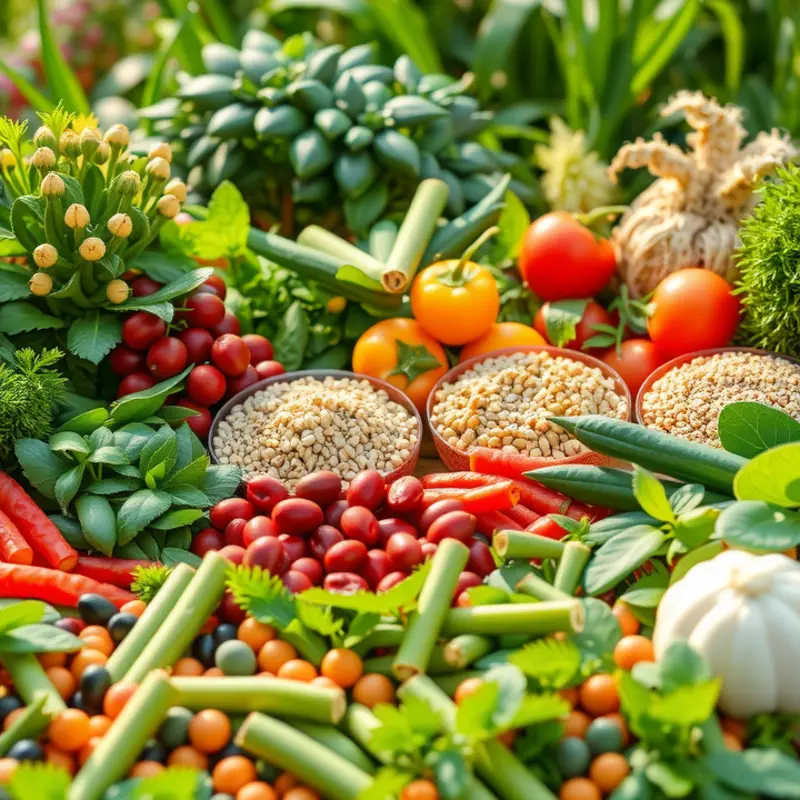Making eco-friendly food choices is essential to reducing our environmental footprint. As individuals become more conscious of their dietary impacts, exploring the world of sustainable foods enriches our lives while safeguarding the planet. Choosing foods that are nutritious, locally sourced, and sustainably produced lays the foundation for a healthier future for both ourselves and the ecosystem.
Farm-to-Table: Embracing Local Sourcing

Eating locally sourced foods is a transformative choice with profound benefits for both the environment and local economies. By prioritizing local produce, you reduce the carbon emissions associated with long-distance food transportation. Transporting food over hundreds, sometimes thousands, of miles requires a significant amount of fossil fuel, contributing to greenhouse gas emissions. By choosing foods grown nearby, you minimize these emissions, making a direct impact in lessening your carbon footprint.
Local sourcing goes beyond environmental perks; it strengthens community ties and supports local economies. Farm-to-table dining means dollars spent stay within the local community, enabling small farms and businesses to thrive. This relationship can bring freshness and quality unmatched by imported counterparts. Locally sourced foods often reach your plate fresher because they are harvested at peak ripeness and require less time in transit.
To start sourcing locally, explore your community’s farmers’ markets. These markets are treasure troves of seasonal produce, artisanal goods, and a place to ask farmers directly about their growing practices. Engaging with vendors can provide insight into sustainable farming practices and the best seasonal picks. If markets aren’t available, consider participating in Community Supported Agriculture (CSA) programs. These programs offer shares in local farms, delivering fresh produce to your doorstep regularly.
Incorporating local produce into your meals can be a delightful culinary adventure. Begin by adapting your meal planning to reflect what is in season. Seasonal vegetables, packed with flavor at their peak, can lead to dishes that shine without heavy seasoning. For example, a simple salad with crisp, local greens requires only a light dressing to let the leafy flavors stand out.
For more complex flavors without resorting to processed seasonings, consider using herbs and spices from local producers. Such ingredients can offer intense taste profiles, enhancing dishes organically. For ideas on flavor enhancement without high salt content, explore tips in this guide.
Additionally, local protein sources, such as free-range eggs or grass-fed meats, bring a distinct quality and taste to your meals. Visit local butchers or co-op markets to find these options. By choosing locally, you support humane animal practices and enjoy fresher, more nutrient-dense food.
Embracing local sourcing is not merely a culinary choice; it’s a commitment to sustainability and community well-being. It encourages a deeper connection with the food you eat and the land it comes from. This farm-to-table journey can transform how you perceive and value your meals, leading to a more gratified and eco-conscious dining experience.
Plant-Powered Plates: The Benefits of a Plant-Based Diet

Transitioning to a plant-based diet offers a powerful way to reduce your ecological footprint. By choosing foods that are less resource-intensive, such as legumes, grains, and seasonal vegetables, individuals can contribute significantly to environmental conservation efforts. Livestock agriculture is one of the leading sources of greenhouse gas emissions, so opting for plants instead can lead to a marked decrease in these harmful emissions.
Sustainability of Plant-Based Foods
Legumes, such as lentils, chickpeas, and beans, are not only rich in protein but also require far less water compared to animal-based proteins. Grains like quinoa and millet thrive on rain-fed agriculture, meaning they depend minimally on extensive irrigation, further highlighting their sustainability. By choosing seasonal vegetables, you not only eat fresh and nutrient-rich produce but also minimize the energy and resources needed for their cultivation and transportation.
The versatility of plant-based ingredients allows for creative and delicious meals. Spiced lentil soup or a hearty grain bowl with roasted seasonal vegetables can act as both nutritious and satisfying meals. For those new to plant-based cooking, adopting these recipes can swiftly become second nature more ideas here.
Health Benefits of Reducing Meat Consumption
Cutting back on meat can lead to numerous health benefits. Studies associate a plant-rich diet with improved cardiovascular health, lower cholesterol levels, and a reduced risk of chronic diseases. Furthermore, plant-based diets often promote weight management due to their emphasis on high-fiber, low-calorie foods, contributing to improved overall health.
Consistency is key when adjusting dietary habits. Begin by incorporating more vegetables and whole grains into your meals. Breakfasts can include oatmeal topped with fruits and nuts, while lunches and dinners might consist of colorful salads rich in different textures and flavors. Such meals not only challenge traditional notions of what a fulfilling meal looks like but also offer considerable health benefits.
Embracing Change for Personal and Environmental Wellness
Implementing these shifts in diet aligns personal health with ecological welfare. By making informed choices about the origins and impact of their food, individuals can support a more sustainable food system. Plant-based diets encourage biodiversity and resource conservation, supporting not only the planet but also the wellbeing of future generations.
Transitioning to this diet does not happen overnight. Start with small steps and gradually replace animal products with plant alternatives. Engage with resources and community support to facilitate a smoother shift. This approach ensures that each plant-powered plate contributes to a healthier body and a more sustainable world.
Final words
Adopting foods with minimal ecological impact is not just a choice but a lifestyle that honors our planet’s resources. By emphasizing local sourcing and plant-based diets, each meal becomes an opportunity to contribute positively to our environment. Making these mindful food selections not only supports healthier ecosystems, but also fosters community connection and personal well-being. Every small step counts towards a sustainable future, so let your food choices reflect your commitment to the earth and the health of future generations.








